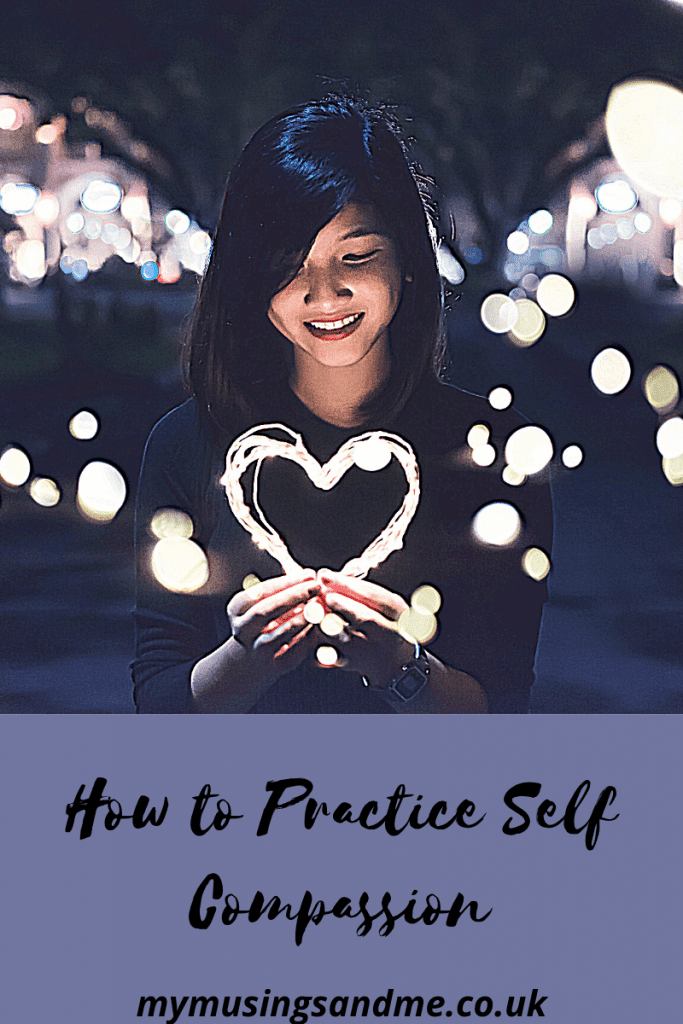This post on self-compassion has kindly been written by Heather from www.heatherleguilloux.ca. For full details of her work and for her social media channels please check below!

There are many moments in life that we are unable to predict, even with the best laid plans. But for those of us who are planners or need to feel a degree of control, uncertainty can leave us with many difficult emotions to process. As we try to navigate our way through the situation feeling broken, fretful, and even scared about what is yet to come.
Emotions, by definition, are ‘a natural instinctive state of mind deriving from one’s circumstances, mood, or relationships with others’. If we break this definition down, we see that emotions are a natural phenomenon. Meaning every human being has this experience.
Emotions are also instinctive which means this phenomenon often happens without a conscious choice. Being ‘flooded with emotion’ can feel like a tidal wave of activity inside our mind and body.
The final part of the definition shows that the emotions we experience happen because of our situation. Or other circumstances such as hormones or our connection with others. Therefore, if we find ourselves in an uncertain situation, this can bring up many different emotions. Which is a completely normal experience to have.
Self-Compassion & Uncertainty
There is no doubt that 2020 has created many uncertainties around the world. And the emotions that come with these uncertainties are a natural, instinctive and normal experience to go through. Yet the practice of self-compassion can provide a sense of grounding and healing within ourselves. This can have a positive ripple effect throughout the world.
The practice of self-compassion begins with a recognition of the suffering that one is currently going through. The experience of suffering is unique to each individual. It may relate to experiencing a loss, life change, or mental health concern. Importantly, there is no suffering that is ‘too small’ to be recognized.
Read more about the Circles of Control method to manage uncertainty here.
What is Self-Compassion?
The process of self-compassion involves caring for your own well-being. Just like you would care for others who are going through a difficult time. This means recognizing your need to be cared for by yourself in the present moment. It may not sound like a difficult task, but for many who are caregivers or parents, putting oneself at the front of the line is likely far from the norm.
Some of the benefits of self-compassion include:
- increased motivation, self-esteem and self-worth
- a reduction of the impacts of mental health concerns
- a bolstered sense of resiliency, self-reliance, and happiness
Choosing Self-Compassion

We must each choose to take care of ourselves. For some, this decision does not come as easily compared to the decision of taking care of others. Those in the caring professions (doctors, nurses, therapists, or even veterinarians, for example) often have the most difficult time dedicating time to slowing down and caring for their own needs. Yet the act of self-compassion indirectly helps others. By ensuring that your own mental health is maintained and strengthened in order to continue caring for others.
It can often feel like this is ‘selfish’; to do something just for your own benefit. But in actuality self-compassion can help. It gives you more energy, and increases empathy. As well as increasing your emotional capacity to be there for others. And provide you with a greater sense of purpose overall.
Read more about why self-care isn’t selfish and how to prioritize it here.
How to Practice Self-Compassion

An anxious mind can produce negative self-talk or even worst-case scenario feedback loops within the mind. It can be difficult or even impossible to escape from these maladaptive thought patterns. Particularly when we are going through our usual daily routine. Combining the practices of mindfulness and self-compassion can help you to bring awareness to your own suffering. While also slowly healing from these painful experiences.
Mindfulness practices can include deep-breathing or muscle relaxation. A grounding technique such as a progressive muscle relaxation exercise can produce even greater healing results.
Here are some basic progressive muscle relaxation steps to follow:
- Find a quiet, comfortable place to sit or lay down, then close your eyes and let your body relax. Take five slow, deep breaths before you begin.
- First, focus on the target muscle group, for example, your left hand. Next, take a slow, deep breath in and squeeze the muscles as hard as you can for about 5 seconds.
- Next, let all the tightness flow out as you exhale. You should feel the muscles become loose and limp, as the tension flows out.
- Continue this practice with other muscles in your body until you feel a sense of relaxation throughout your body.
Mindfulness and PMR
As you practice your chosen mindfulness activity, bring awareness to the suffering you may be experiencing in this moment. Listen to your thoughts and emotions without judgement and accept what is coming into your mind. Respond to this suffering with kindness and compassion with an internal message of understanding. Embrace the pain that you are experiencing in this moment. And, with time, this pain can transform into strength and courage.
Kristin Neff, an expert on mindful self-compassions shares that
“if we can fully accept that things are painful, and be kind to ourselves because they’re painful, we can be with the pain with greater ease”
Self-compassion is not a ‘quick fix’ or bandaid for the emotions that arise during uncertain times. But it can be a tool that we can practice daily to ease our suffering. And show ourselves gratitude and kindness for the difficult moments life can throw at us.
Read more about how we can all practice mindfulness here.
What are your thoughts on practising self-compassion? And have you tried it before? Is it part of your routine? How do you practise? Let us know below!

This post was written by Heather. A blogger with a passion for sharing her knowledge and experience as a therapist. And to help others understand and strengthen their mental health and well-being. As a mental health blogger, she strives to educate individuals on topics that may seem taboo but actually impact a wide range of people. She shares a range of articles on her website www.heatherleguilloux.ca on topics including anxiety and depression, as well as how to live a healthy lifestyle.
You can find her on the following social media channels: Pinterest, Instagram, Facebook and Twitter or contact her via Email.


Great post! It is so important to practice self-compassion, especially now. I love the mindfulness tips. I think staying in the present moment is key to being able to get through difficult times.